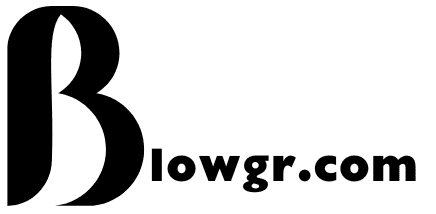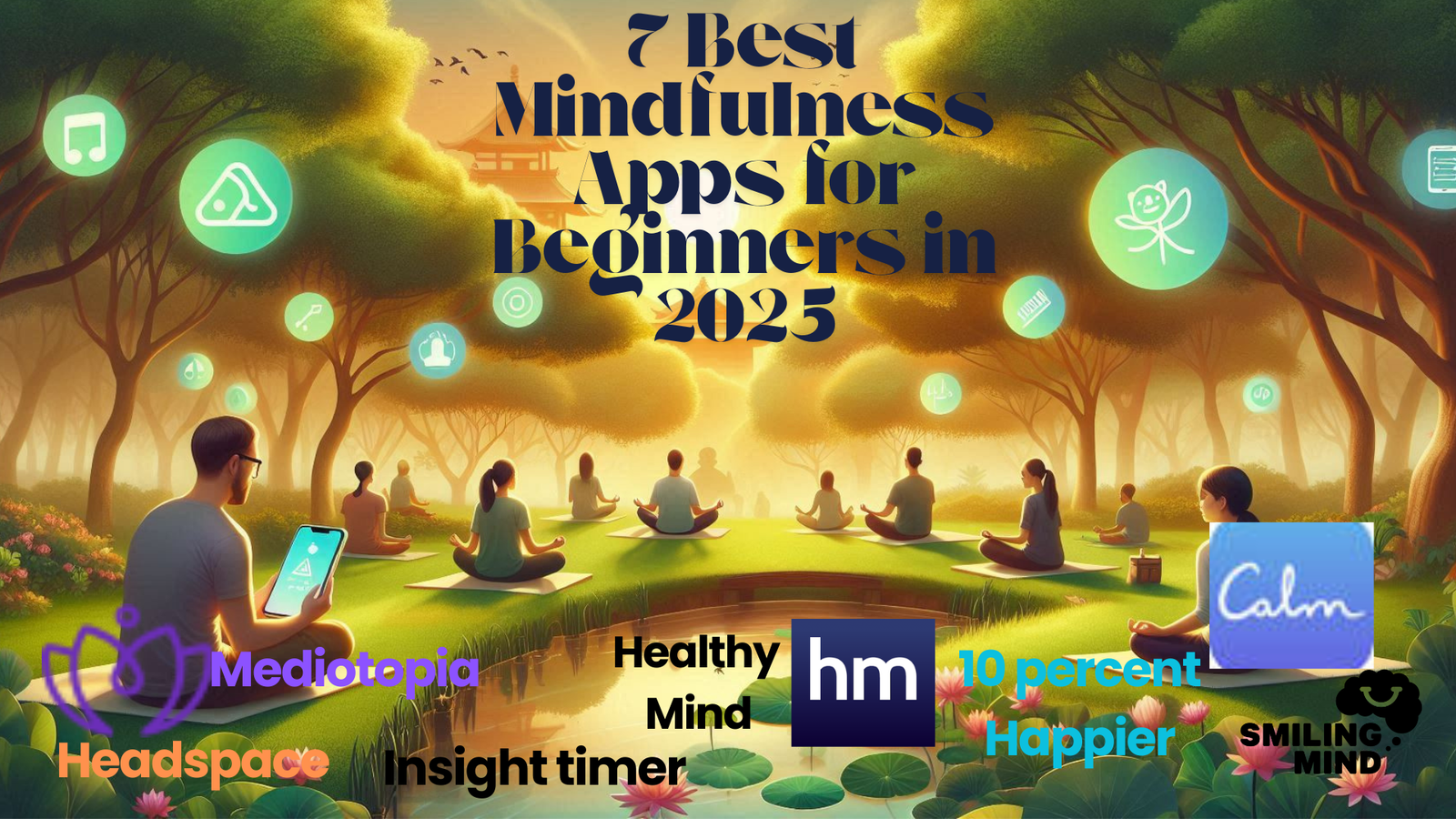In today’s hectic world, finding a moment of calm can feel like a luxury. Between work, family, and endless notifications, stress creeps up on us, leaving us overwhelmed and isolated. This is where mindfulness comes into play, a simple practice that helps you stay in the present, reduce anxiety, and reclaim your mental space. And the good news? You don’t have to be a meditation guru to get started. With the best mindfulness apps for beginners in 2025, anyone can dip their feet into mindfulness, no incense or yoga mat needed.
Mindfulness apps have boomed in popularity because they make meditation accessible and guide you through practices that fit into your busy life. Whether you want to get rid of stress fast by using mindfulness apps or develop a lasting habit, these tools provide an easy entry point. In this article, we’ll explore the top mindfulness apps for beginners, explaining their features, benefits, and why they stand out. We will also learn how these apps work, what science says about mindfulness, and how to choose the best mindfulness app in 2025 for your needs. Let’s begin your journey toward the gift of mindfulness.
Table of Contents
Why Mindfulness Matters for Beginners in 2025

Mindfulness means accepting the present moment with full awareness, without criticism or judgment. It sounds easy, right? But when your mind is filled with to-do lists or worries, it’s harder than it seems.
Research backs up its benefits: A 2014 study from Johns Hopkins University found that mindfulness meditation can reduce symptoms of anxiety and depression by up to 30% in some cases. For beginners, apps make this practice accessible and simple by providing structure and guidance.
The beauty of mindful apps is that they help you when you need it. Whether you have five minutes during your lunch break or you want to relax before bed, these apps deliver the best mindfulness meditations in bite-size chunks that won’t overwhelm you. They are like a personal coach in your pocket, helping you build a habit that sticks.
What Makes a Great Mindfulness App for Beginners in 2025?
Before we talk about the top mindfulness apps, let’s talk about what sets a great app apart for meditation beginners:
- Ease of use: A clean, intuitive interface ensures you’re not fumbling around in menus instead of meditating.
- Beginner-friendly content: Look for guided sessions under 10 minutes, clear instructions, and basic courses.
- Variety: Options for stress, sleep, meditation, or anxiety let you figure out what works for you.
- Affordability: Free versions or low-cost subscriptions make mindfulness accessible.
- Expert guidance: Teachers like renowned meditation expert Sharon Salzberg add credibility and warmth.
With these things in mind, let’s look at the best mindfulness meditation apps for beginners for 2025.
Top 7 Mindfulness Apps for Beginners in 2025
1. Headspace (The All-in-One Starter Kit)
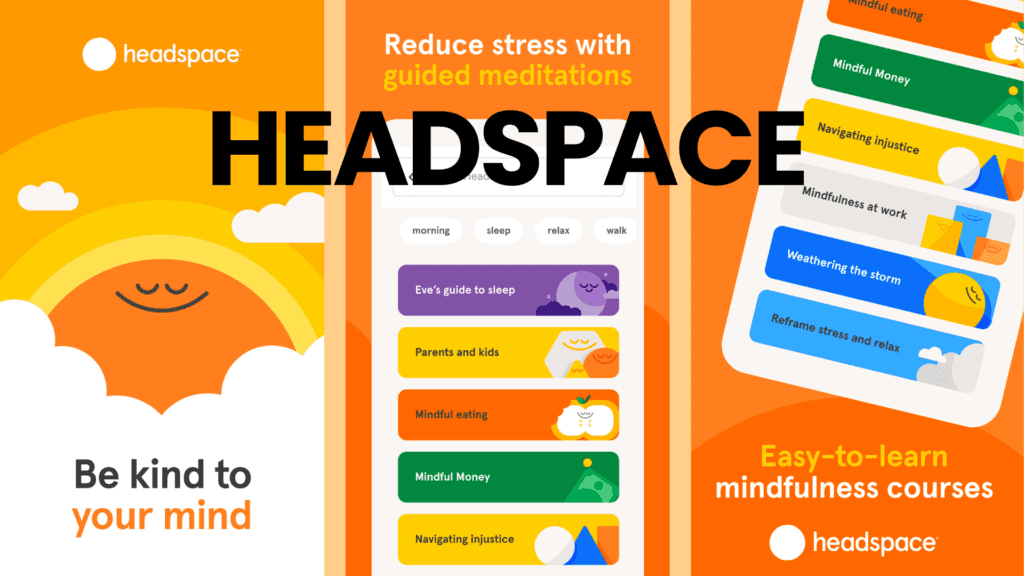
When people think of mindfulness meditation apps, Headspace is one of the first things that comes to mind, and for good reason. It’s like a friendly guide who holds your hand during your first meditation. With over 70 million downloads worldwide, Headspace combines science-backed techniques with a playful, colorful design that makes meditation accessible.
Why it is Beginner-Friendly
Headspace is “Basics” course is a 10-day introduction to mindfulness, with sessions that are less than three minutes long. Narrated by co-founder Andy Puddicombe, a former Buddhist monk, the app breaks down concepts like focusing on your breath or paying attention to thoughts without getting lost in them. It’s perfect for people who want to get rid of stress fast by using mindfulness apps without spending hours.
Features
- Guided meditations: This includes stress, sleep, and even mindful eating.
- Sleepcasts: Relaxing stories to help you wind down.
- Move Mode: Gentle yoga and movement sessions for the mind-body connection.
- Free trial: Access to basic content before paying $69.99/year.
Why Choose Headspace?
If you’re looking for something structured and varied, Headspace could be a great option. Its animations and clear explanations make it feel like a warm hug for your brain. Plus, it’s backed by research, with a 2020 study from the University of California showing that Headspace users reported a 12% reduction in stress after just two weeks.
2. Calm(Your Gateway to Serenity)
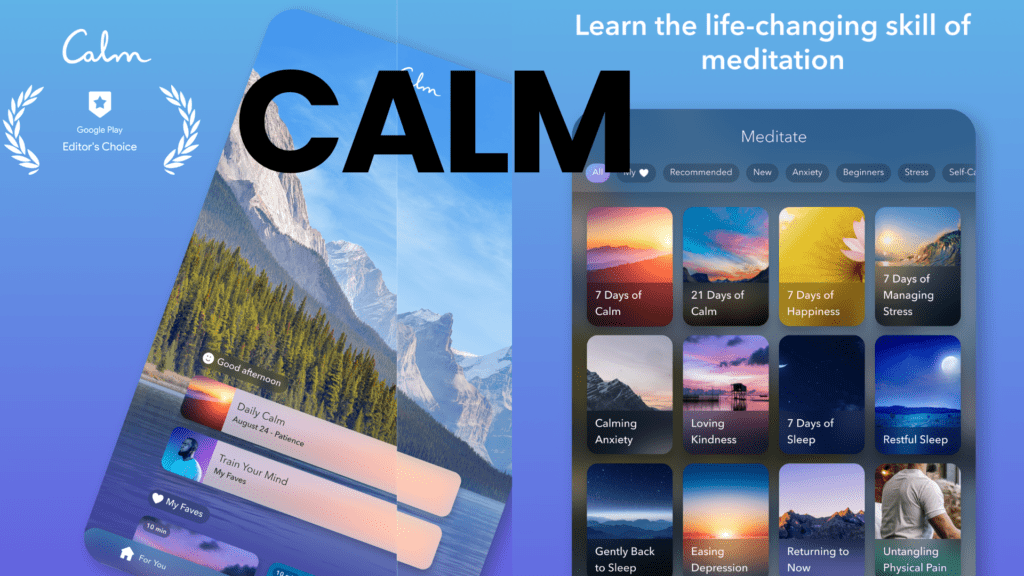
Calm is another giant in the world of mindfulness apps, known for its soothing aesthetic and celebrity-narrated content. With over 100 million downloads, it is a favorite for beginners looking to create an immersive experience that feels like a mini-retreat.
Why it is Beginner-Friendly
Calm’s “7 Days of Calm” is a beginner-friendly course that introduces mindfulness through short, guided sessions. The app emphasizes relaxation, making it ideal for those looking for the gift of mindfulness to combat daily stress. Its Daily Calm feature offers a new 10-minute meditation every day, which keeps things fresh.
Features
- Sleep Stories: Bedtime stories narrated by voices like Matthew McConaughey.
- Breathing Exercises: Quick tools to calm your nervous system.
- Masterclasses: In-depth dives into topics like resilience with experts like Sharon Salzberg.
- Cost: Free version available; Premium is $69.99/year.
Why Choose Calm?
Calm’s calming interface and focus on sleep make it a great option if stress keeps you up at night. A 2021 study from Stanford University found that Calm users experienced a 15% improvement in sleep quality after consistent use. If you want the Sharon Salzberg meditation app experience, her masterclasses add a layer of depth.
3. Insight Timer – Best Free App
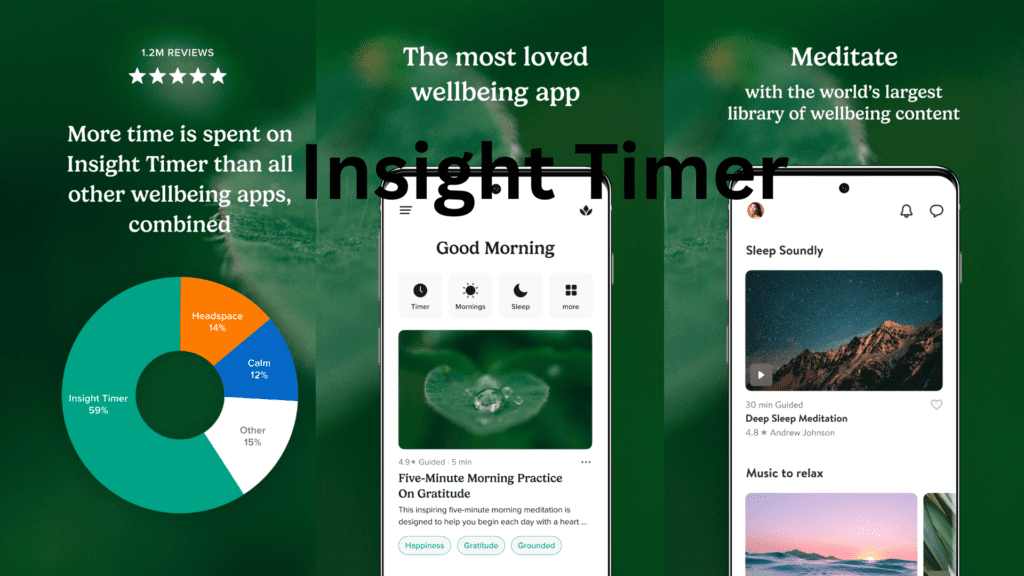
Unlike many mindfulness apps that require a subscription, Insight Timer offers thousands of free meditations from leading mindfulness teachers. Insight Timer is one of the best mindfulness apps for beginners on a budget. With over 150,000 free meditations, it’s a treasure trove of content from teachers like Jack Kornfield and Sharon Salzberg. This app fosters a sense of community, showing you how many people are meditating around the world at any given time.
Why it is Beginner-Friendly
Insight Timer’s huge library may seem overwhelming, but its “Beginner’s Guide” includes short, accessible meditations. You can filter by length (less than a minute) or goal, such as reducing anxiety or improving focus. It’s perfect for people who want to try something new without spending a lot of money.
Features
- Free content: Thousands of guided meditations at no cost.
- Live events: Group meditations every hour for real-time connection.
- Timer: Customizable for unguided practice as you grow.
- Premium option: $59.99/year for offline access and courses.
Why choose Insight Timer?
If you’re hesitant to commit financially, Insight Timer’s free offering is unmatched. Its community atmosphere makes meditation less solitary, and with the Sharon Salzberg meditation app content, you’re learning from a master.
4. Ten Percent Happier(Mindfulness with a Skeptic’s Edge)

Inspired by journalist Dan Harris’ bestselling book, Ten Percent Happier is designed for people who think meditation might be “too weird.” It’s based on practical, science-based approaches, making it one of the top mindfulness apps for analytical beginners.
Why it is Beginner-Friendly
The app’s “Meditation for Fidgety Skeptics” course is a hit, offering 5-10 minute sessions that demystify mindfulness. Teachers like Sharon Salzberg and Joseph Goldstein guide you with humor and clarity, addressing common doubts like “Am I doing this right?”
Features
- Practical focus: Meditation works to deal with real-life situations like work stress or parenting.
- Coaching: Chat with meditation coaches to get personalized tips.
- Podcasts: In-depth discussions on mindfulness.
- Cost: Subscribe for $99.99/year after a free trial.
Why choose Ten Percent Happier?
If you are a beginner and want guidance without any hassle, this app is made for you. You can use this app without any confusion. A 2022 study from Brown University found that its users reported a 10% increase in emotional resilience after one month. This is a solid choice for those looking for the best mindfulness meditation with a grounded approach.
5. Smiling Mind – Best for Kids & Teens
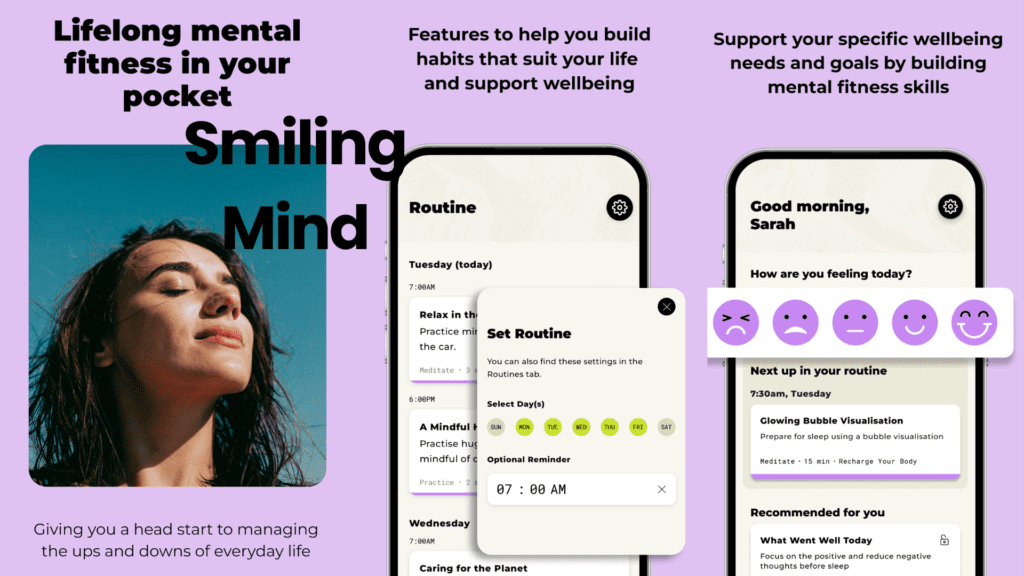
Developed by Australian psychologists, Smiling Mind is a free app focused on making mindfulness accessible to everyone. Smiling Mind is one of the few mindfulness apps designed specifically for children and teens. Although it offers programs for children and teachers, its adult content is just as strong, making it a hidden gem among mindfulness apps.
Why it is Beginner-Friendly
Smiling Mind’s “Mindfulness Foundations” program includes 35 sessions, most of which are under 10 minutes, making them perfect for beginners. The app’s structured approach helps you form habits, and its short “mindful moments” are great for instant stress relief.
Features
- Completely free: There are no hidden costs or subscriptions.
- Structured programs: These cover topics like stress, sleep, and digital detox.
- Science-backed: It is developed with mental health professionals.
- Offline access: It has download sessions to use anywhere.
Why Choose Smiling Mind?
If you are unable to try this gift of mindfulness due to money, then Smiling Mind is a good option. This app is completely free and is run by a non-profit organization. It has been created using scientific methods, so it can be trusted. According to a survey conducted in 2023, people who use it daily felt a reduction in their stress by about 20%.
6. Healthy Minds Program(Neuroscience Meets Mindfulness)
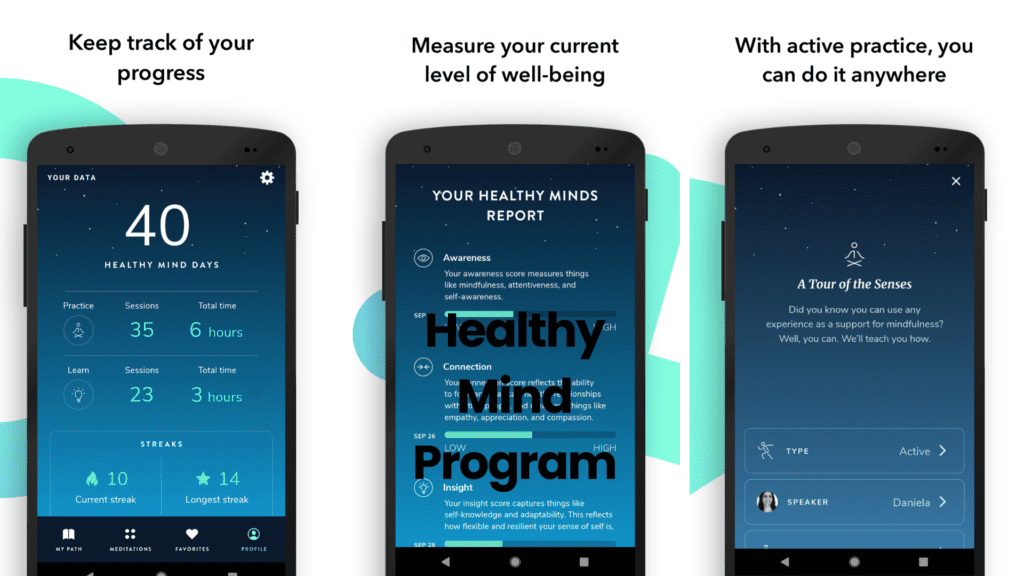
The Healthy Minds program is a free mindfulness meditation app created by the Center for Healthy Minds at the University of Wisconsin-Madison. The app combines science and meditation. It is a popular choice in 2025 for its clean, research-based approach.
Why It is Beginner-Friendly
This app has four pillars – awareness, connection, insight, and purpose – guide you through short, digestible lessons (5-15 minutes). Baseline Survey tailors content to your needs, making it feel personal from day one.
Features
- Free content: Full access, no payment barriers.
- Progress tracking: Score your progress in four key areas.
- Flexible sessions: Adjust the length to suit your schedule.
- Science-driven: Created by neuroscientists.
Why Choose Healthy Minds Program?
This app is great for people who want to start mindfulness without spending money and who have a clear goal. It is easy to use for beginners. Many users have reported that it helped them focus more after using it for just two weeks. The special thing about it is that it has been developed based on scientific methods, which increases the confidence of its effectiveness. If you want to keep your mind calm and increase focus, then this app is a great option.
7. Meditopia for Personalized Calm
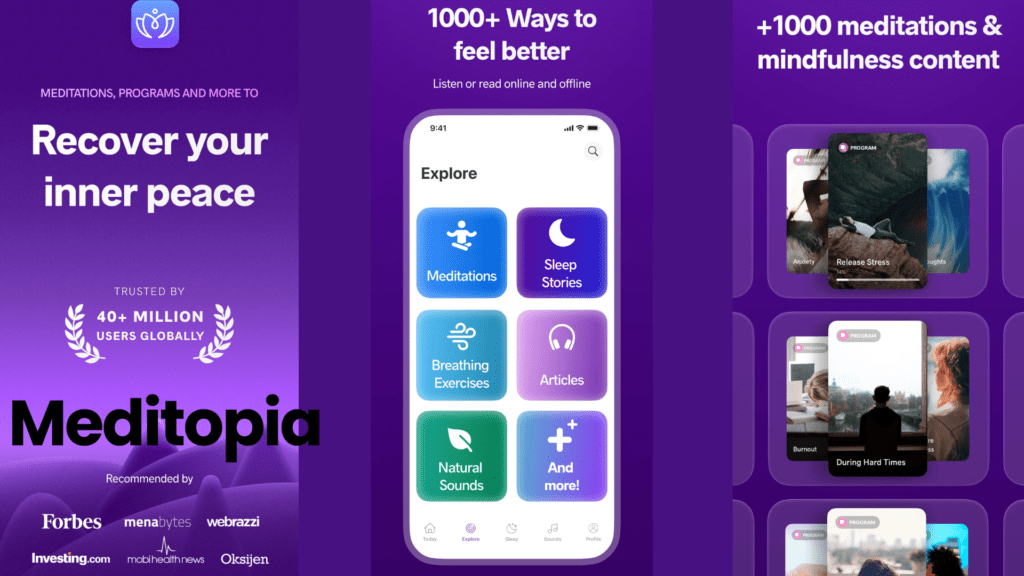
Meditopia is a rapidly growing mindfulness app that is a special part of our list in 2025. Its special feature is that it offers an experience according to the needs of every user and its interface is very clean and easy. This app is specially designed for people who have a very busy routine , that is, no matter how busy you are, you can include mindfulness in your life. It offers meditation, relaxation music, and positive thinking audio sessions, which help in bringing mental peace and emotional balance.
Why It is Beginner-Friendly
The course called ‘Introduction to Meditation’ is for those who want to start meditation. It consists of short sessions of just 5 to 10 minutes, so that you can slowly get used to it comfortably. It also has a mood check-in option, which helps the app understand how you are feeling and personalizes your meditation journey accordingly. It is like you have your own mindfulness coach, who is helping you at every step. This feature of Mediotopia is especially beneficial for those who want to learn to understand and handle their emotions.
Features
- Guided Meditations: Stress, sleep, and self-confidence options.
- Mood Tracker: Adjusts content to your feelings.
- Background Sounds: Customize with rain, waves, or forest ambiance.
- Pricing: Free version; premium at $39.99/year.
Why Choose Meditopia?
The most special thing about this app is its personalization i.e. its ability to adapt to every user. A study conducted in 2024 revealed that after just one month of use, people’s mental well-being improved by 14%. This is a great app especially for beginners who want freedom and a slightly stylish experience. In this, you can choose meditation sessions according to your needs and mood. Whether you want to meditate early in the morning or before sleeping at night, this app easily fits into your schedule. Its user interface is also very attractive and user-friendly, which makes this top mindfulness app for a fun and relaxing experience.
How to Get Rid of Stress Fast by Using Mindfulness Apps
When stress gets overwhelming and you need quick relief, mindfulness meditation apps can help. Here are some simple ways these apps can help you calm down quickly:
- Start with breathing exercises: Apps like Calm and Headspace offer just 1-minute guided breathing exercises that can slowly calm your heart and ease pent-up tension in your body.
- Try a body scan: The Insight Timer and Smiling Mind apps offer short body scan sessions that teach you where you hold tension in your body and how to slowly release it.
- Try SOS meditation: The Ten Percent Happier app has short 3- to 5-minute meditations called “Emergency Meditations,” which are great for when you’re feeling overwhelmed or overwhelmed
- Set reminders: Most apps let you set an alarm or reminder for a mindfulness break, so you can stop periodically to relax and prevent stress before it builds up.
How to Choose the Right Mindfulness App for You
| Your Goal | Best Apps |
| Learn meditation from scratch | Headspace |
| Improve sleep and relaxation | Calm |
| Explore without paying | Insight Timer |
| Seeking a skeptic-friendly approach | Ten Percent Happier |
| Mindfulness for children | Smiling Mind |
| Neuroscience Meets Mindfulness | Healthy Minds Program |
| Personalized Calm | Meditopia |
With so many top mindfulness apps out there, picking the right one can feel daunting. Choosing a mindfulness app is not a one-size-fits-all decision.
Here is a simple checklist:
- Consider Your Goals: Want better sleep? Try Calm.Need stress relief? Headspace or Insight Timer. Seeking a skeptic-friendly approach? Go for Ten Percent Happier.
- Check Your Budget: Smiling Mind and Insight Timer offer robust free options, while Headspace and Calm are worth the investment for premium features.
- Test the Vibe: Download a few apps and try their free trials. Do you connect with the teacher’s voice or the app’s design?
- Look for Community: If you thrive on connection, Insight Timer’s live events or Ten Percent Happier’s coaching might resonate.
Ultimately, the best mindfulness app is the one you’ll use consistently. Even five minutes a day can make a difference—research from UCLA’s Mindful Awareness Research Center shows that short, regular practices improve focus by 15% over time.
The Science of Mindfulness Apps in 2025
Is mindfulness just a way to relax? No, it is much more than that. It’s completely based on science.
When you meditate, the part of your brain that is associated with tension and fear – called the Amygdala – gradually becomes less active. At the same time, the part that is used in thinking, understanding and making the right decisions – the Prefrontal Cortex – starts becoming stronger.
Interestingly, a Harvard research in 2019 found that people who used mindfulness apps for just eight weeks felt 25% less anxiety.

Now the question arises – How do these apps work?
Nowadays mindfulness apps not only provide guided meditations, but they have also been made fun to use. As you practice daily, they motivate you with streaks, badges and progress showing features. Also, the content is personalized according to your needs and mood.
The best part is You don’t need to go to a meditation center or class. Just pick up your phone, open the app and start meditating anywhere — be it the office, the park, or a corner of your house.
As Dr. Judson Brewer, a mindfulness researcher at Brown University, says:
“Apps have made meditation easy and accessible to everyone. People who might never be able to go to a meditation center are now able to do it.”
Common Misconceptions About Mindfulness Apps
Beginners often have misconceptions about mindfulness apps. Let’s bust some common myths:
“I have to have a blank mind while meditating”- No, it is not. Mindfulness is not about banishing your thoughts, it is about observing them without judgment. That is what apps like Headspace teach you — how to simply watch your thoughts come and go without getting caught up in them.
“I don’t have time to meditate”- People often think meditation needs hours of practice, but that’s not the case. Apps like Insight Timer also offer short, 1- or 2-minute sessions that can be done at any time during the day.
“It sounds too spiritual, too much for me”- Not everyone is religious or spiritual — and mindfulness doesn’t have to be. Apps like Ten Percent Happier explain in a very practical way how mindfulness can help you with stress, focus, and sleep — without any “spiritual talk.”
In fact, these apps take away all these doubts and make mindfulness an easy and natural part of your daily life, without any pressure or hassle.
Actionable Tips for Beginners Using Mindfulness Apps
- Start Small: Commit to 3-5 minutes daily to build a habit without feeling overwhelmed.
- Pick a Time: Meditate at the same time each day—like after coffee or before bed—for consistency.
- Explore Free Trials: Test apps like Headspace or Calm to find your fit before subscribing.
- Use Headphones: They enhance focus and block distractions, especially for guided sessions.
- Track Progress: Check your app’s stats to celebrate small wins, like a 5-day streak.
- Mix It Up: Try different meditations (stress, sleep, focus) to discover what clicks.
- Be Patient: It’s normal for your mind to wander. Apps teach you to gently return to the moment.
With these tips and the best mindfulness apps for beginners in 2025, you are ready to embrace mindfulness and transform stress into calm, one breath at a time.
Conclusion
The best mindfulness apps for beginners in 2025 can be the first step towards a calmer, more focused life.
Whether you choose the planned approach of Headspace, listen to the relaxing sleep stories of Calm, try Insight Timer’s free guided meditation library, take the simple and practical approach of Ten Percent Happier, or prefer the selfless mission of Smiling Mind—each option will help you taking a step toward the gift of mindfulness.
The goal of these apps isn’t to be perfect, but to find a little bit of time for yourself each day—even if it’s just two or three minutes.
So why not download one of the top mindfulness apps today, try a short meditation, and see how it feels.
As renowned mindfulness expert Sharon Salzberg says:
“You don’t have to believe anything—just start where you are.”
Once you get started, you will see for yourself how these apps gradually help you get rid of stress fast by using mindfulness apps and lead you to a good habit.
Mindfulness is a powerful tool for improving mental well-being, and the right app can make the journey smoother and more enjoyable. Whether you choose Headspace for its structured approach, Calm for relaxation, or Insight Timer for free access to thousands of sessions, the key is to start small and stay consistent.
By incorporating just a few minutes of mindfulness into your daily routine, you can experience profound benefits, from reduced stress to improved focus and overall happiness. So, why not download one of these apps and start your mindfulness journey today?
FAQs About the Best Mindfulness Apps for Beginners in 2025
Q. What is the best mindfulness app for absolute beginners?
A. Headspace and Smiling Mind are top choices due to their simple interfaces and beginner-focused courses. Start with Headspace’s “Basics” or Smiling Mind’s “Mindfulness Foundations” for guided sessions under 10 minutes.
Q. Are free mindfulness apps worth trying?
A. Absolutely, Insight Timer and Smiling Mind offer thousands of free meditations that rival paid apps. They are great for testing the waters before committing to a subscription.
Q. How long should I meditate as a beginner?
A. Start with 3-5 minutes daily. Apps like Calm and Insight Timer have short sessions that build confidence. Gradually increase to 10-15 minutes as you get comfortable.
Q. Can mindfulness apps really reduce stress?
A. Yes, Studies like one from Stanford in 2021, show app-based mindfulness can lower stress by 10-15% with regular use. Quick breathing exercises or SOS meditations work for immediate relief.
Q. How do I stay consistent with mindfulness apps?
A. Set a daily reminder in the app, choose a specific time (like morning or bedtime), and start with short sessions. Apps like Ten Percent Happier track streaks to keep you motivated.
Q. Are mindfulness apps suitable for kids?
A. Yes, apps like Headspace and Smiling Mind offer kid-friendly meditations for ages 3-12. They focus on focus, sleep, and emotional regulation, making mindfulness fun and accessible.
